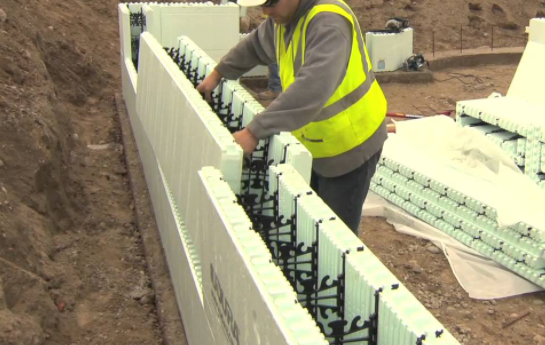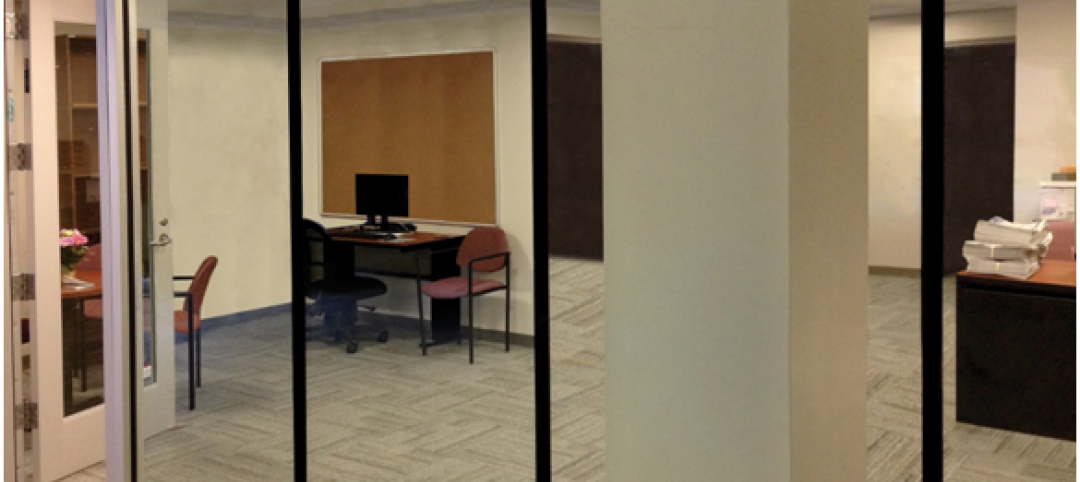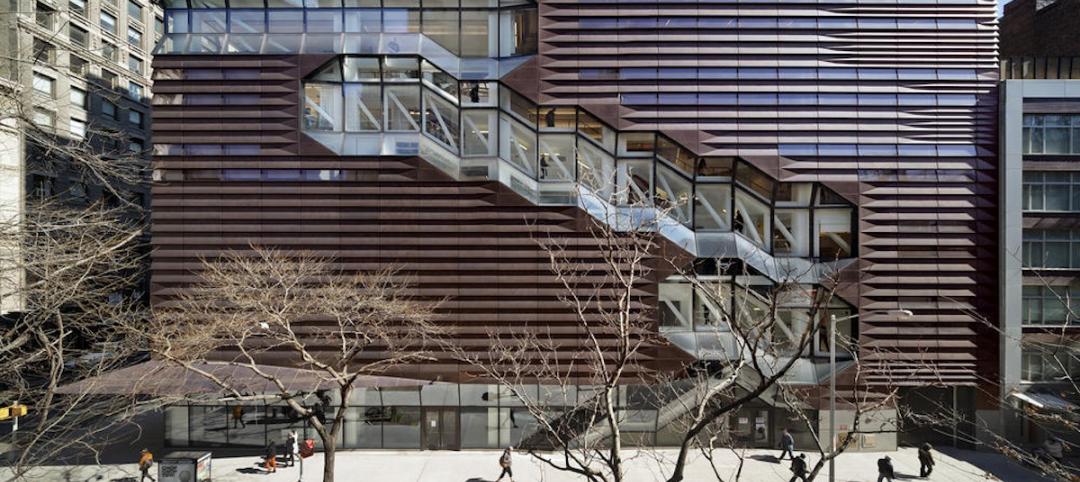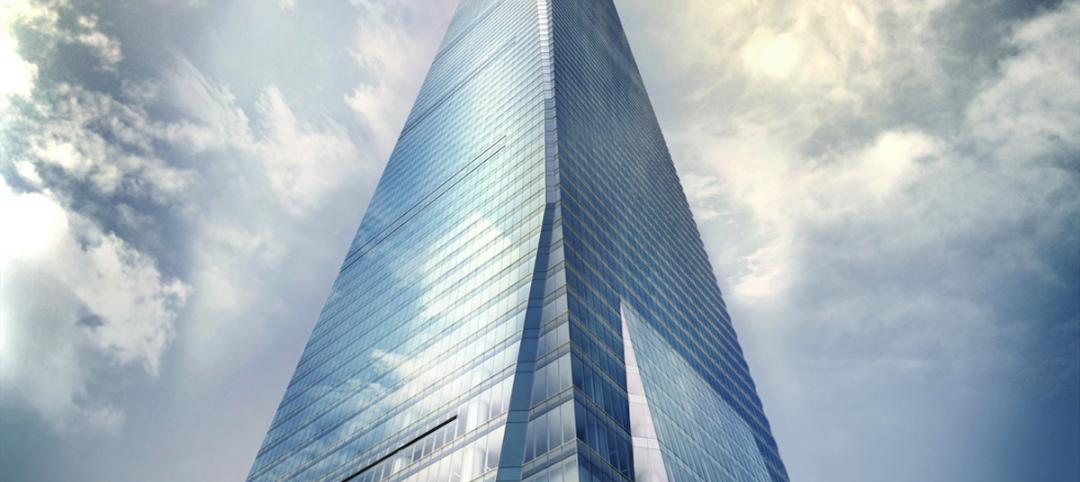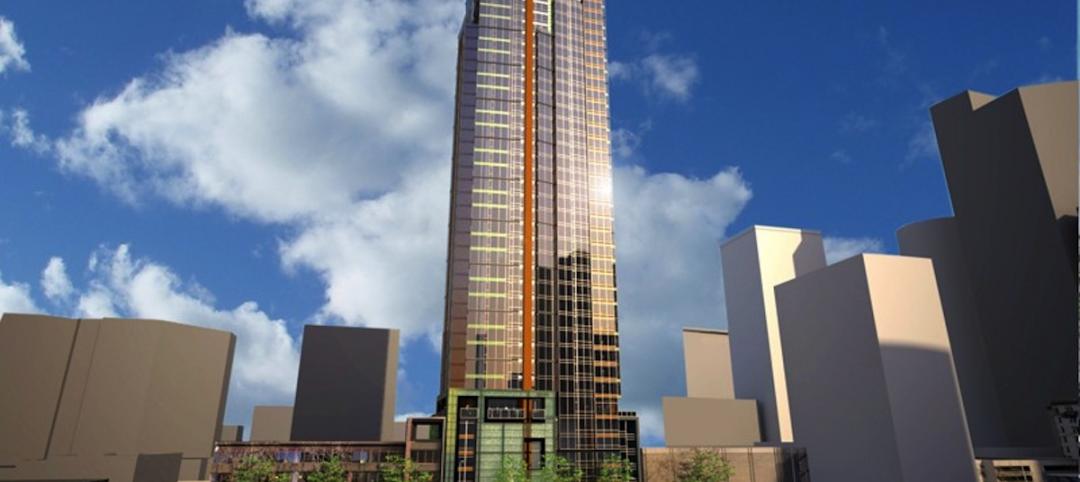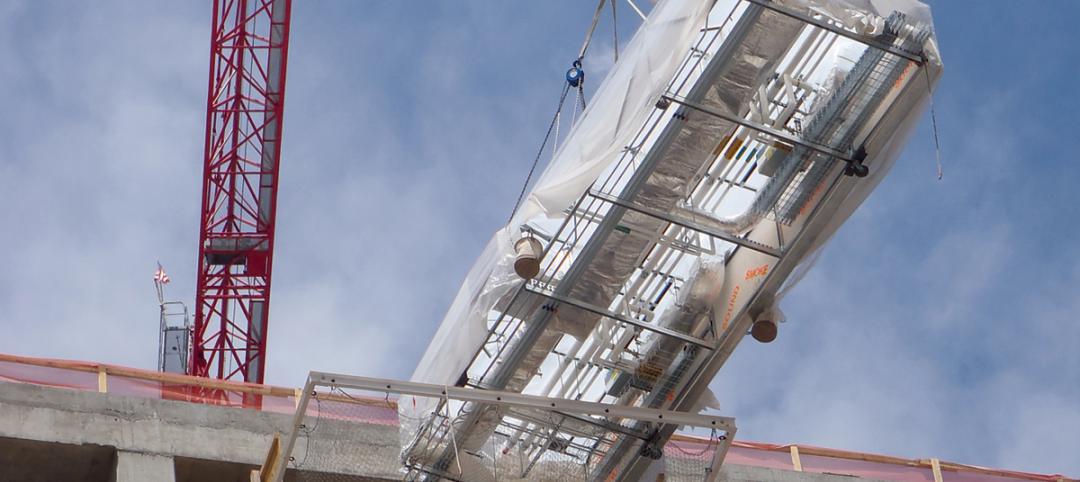Insulating concrete forms have a long history of success in low-rise buildings, but now Building Teams are specifying ICFs for mid- and high-rise structures—more than 100 feet. ICF walls can be used for tall unsupported walls (for, say, movie theaters and big-box stores) and for multistory, load-bearing walls (for hotels, multifamily residential buildings, and student residence halls).
Our trusted ICF experts offer the following tips for designing and constructing tall ICF walls:
1. Pre-plan your job by drawing a simple cross section with the ICF you are using.
The cross section will show you how openings line up with the coursing of the ICF joints and where embeds will be placed, says Glen Klassen, regional manager with ICF manufacturer Arxx, Cobourg, Ont. "During the build process, your crew can follow this cross section to know when to stop placing forms and start placing embeds."
2. Account for the ICF formwork course height.
Designers can greatly reduce the amount of formwork cuts the contractor will be required to make by considering the course height of the ICF product when designing the walls, says Kelvin Doerr, VP of engineering and technical services for Reward Wall Systems, Omaha, Neb. Doerr says architects should factor in wall heights, window heights, and floor elevations when possible.
3. Base concrete slump and aggregate size on ICF manufacturer recommendations.
Both concrete slump and aggregate size are impacted by the formwork tie configuration within the formwork cavity, as well as by the amount of open space available around the ties to allow concrete to effectively flow within the forms, says Donn C. Thompson, AIA, LEED AP, CGP, director of Low Rise Buildings with the Portland Cement Association, Skokie, Ill. "Ties with smaller openings will require smaller aggregate to insure the concrete flows effectively through the forms," he says.
Arxx's Klassen offers this rule of thumb: If the concrete is restricted slightly at the top form around the rebar before flowing into the wall, it's just right. If the concrete gets restricted to the point of not flowing down into the wall, it's too low of a slump. If the concrete flows freely into the wall with no restriction, it is likely too high a slump.
4. Consider the STC rating needed for the job.
Once you know the sound transmission class, consider what needs to be added to the ICF wall if an STC rating of 50 or higher is required, says John Krzic, accounts manager with Amvic Building System, Toronto. "For example, by adding a resilient channel to the ICF wall and then installing the drywall, it will increase the STC rating of the wall assembly," says Krzic.
5. Take steps to ensure the concrete completely fills the form.
"One concern with tall ICF walls is that concrete may not fill all parts of the form since the walls are generally thin," says Lionel Lemay, PE, SE, LEED AP, CAE, senior VP of sustainable development, National Ready Mixed Concrete Association, Silver Spring, Md. To help avoid holes and gaps in the concrete pour, Lemay advises the following:
-
Place a single layer of reinforcement in the center of the wall to allow for more space on either side of the reinforcement.
-
Allocate greater spacing of reinforcement than is required in ACI 318 14.5, which requires a maximum spacing of three times the wall thickness or 18 inches, whichever is smaller.
Consider using self-consolidating concrete. "Keep in mind that self-consolidating concrete exerts greater pressure on forms, so additional bracing will be required for most ICF systems," says Lemay.
6. Specify an ICF that is fully reversible.
"These forms have no top, bottom, left, or right side, and, therefore, are more efficiently stacked, reducing construction costs," says Reward's Doerr.
7. Repeat window patterns when possible.
In multistory load-bearing applications such as multifamily, senior living, and hotel projects, try to repeat window patterns from floor to floor so that the openings remain stacked for the full height of the wall assembly, says PCA's Thompson. This maximizes efficiency in design and construction.
8. Make sure, in noncombustible Type I, II, III, and IV multistory building projects, that the noncombustible floor system intersects the foam plastic on the interior of the building.
"The foam plastic must not be continuous from floor to floor, and special detailing is necessary to meet these requirements," says Doerr. In addition, IBC states that interior walls must be covered with a 15-minute thermal barrier. Doerr says half-inch gypsum board will do the trick.
9. Brace from the inside.
The higher the wall, the more difficult and costly it is to reach the exterior of the wall with bracing, says Amvic's Krzic. "Proper bracing will help to ensure that walls will be straight and level," he says. "This is important as it can affect other sub trades, wall finishes, and structural integrity of the building."
More on insulating concrete forms at:
13 tips on working with insulating concrete forms
How Insulated Concrete Forms Help Reduce Energy Consumption
English inspired church built with insulated concrete forms
Related Stories
Sponsored | Building Team | Apr 29, 2015
Parsons Brinckerhoff and former CEO partner to solve the “brain drain” challenge
For firms large and small, hiring is always a balancing act between keeping the business moving forward and being patient to find the right people to fit into your organization
Sponsored | Building Team | Apr 24, 2015
New Products and Programs to Check Out at the 2015 AIA Convention
There is no bigger annual gathering of architects and design professionals in North America quite like the AIA National Convention.
Green | Apr 22, 2015
AIA Committee on the Environment recognizes Top 10 Green Projects
Seattle's Bullitt Center and the University Center at The New School are among AIA's top 10 green buildings for 2015.
Green | Apr 22, 2015
GSA's Federal Center South Building honored with AIA Top Ten Plus Award for 'verified' sustainable performance
The annual award recognizes green building projects that have quantifiable metrics demonstrating the performance and positive impact of the sustainable design.
Cultural Facilities | Apr 20, 2015
Jean Nouvel loses court battle against Philharmonie de Paris over alleged design ‘sabotage’
Nouvel boycotted the January opening of the facility and asked for his name to be removed from all references to the work.
High-rise Construction | Apr 17, 2015
Construction begins on Goettsch Partners-designed Nanning China Resources Center Tower
The tower's design is derived from its multiple uses, which include 170,000 sm of Class A office space, 5,000 sm of boutique retail, and a 45,000-sm luxury Shangri-La hotel.
High-rise Construction | Apr 16, 2015
Construction begins on Seattle's Tibet-inspired Potala Tower
Construction on the 41-story Potala Tower in Seattle finally kicked off following a ground-breaking ceremony seven months ago.
Architects | Apr 14, 2015
Jeanne Gang, Bjarke Ingels among participants for inaugural Chicago Architecture Biennial
Some big names include Bjarke Ingels Group and Studio Gang Architects
Building Team Awards | Apr 10, 2015
Prefab saves the day for Denver hospital
Mortenson Construction and its partners completed the 831,000-sf, $623 million Saint Joseph Hospital well before the January 1, 2015, deadline, thanks largely to their extensive use of offsite prefabrication.
BIM and Information Technology | Apr 9, 2015
A carboard box by Google can bring virtual reality to architecture
The global search engine giant has launched a new product, Google Cardboard, that easily allows users to experience virtual reality.


